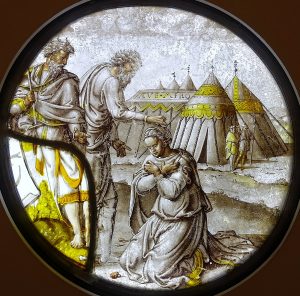Ord Om ordet
Sibling Rivalry
Miriam and Aaron spoke against Moses because of the Cushite woman whom he had married, for he had married a Cushite woman; 2 and they said, “Has the Lord indeed spoken only through Moses? Has he not spoken through us also?” […] And the anger of the Lord was kindled against them, and he departed; 10 and when the cloud removed from over the tent, behold, Miriam was leprous, as white as snow. Numbers 12.1-13.
Few stories in Scripture are more moving than that told in the second chapter of Exodus about a young girl who, on the shore of the Nile, accompanies the bullrush basket in which lies her baby brother, laid there to preserve him from the ire of a maniac Pharaoh.
The girl saw how Pharaoh’s daughter, come to the river to bathe, picked up the child. Emerging from the reeds she presented a ruse by which the infant would be put back into the arms of his mother, brought in as wet-nurse.
What a bond between Moses and Miriam, his elder sister! How protective of him she must have felt! When Israel left Egypt, the two of them were allies in a project of redemption. Their brother, Aaron, too, played a crucial part, totally at one with Moses. The sibling trio seemed inseparable, bound together by affection and faith.
A diabolical impulse, though, could drive even these apart. We have heard how Miriam and Aaron began complaining, increasingly resenting their younger brother. The Lord spoke up for Moses. The other two learnt their lesson starkly.
And we, what can we learn? This above all: Moses, we read, was ‘the meekest man on the face of the earth’. So free of presumption was he that he was fit to see God. This meekness was not just an infused virtue, however; it was acquired through battle.
Even as the people of Israel, in a general way, began a campaign of murmuring against Moses as soon as they had crossed the Red Sea, he faced detraction from his nearest and dearest. These fall-outs, which pushed him to his limit, were not pointless. Others’ impure motives cleansed him, divesting him of vanity and selfish attachment.
Trials, interior and external, can serve a providential purpose. Let’s not waste opportunities. Instead of letting ourselves be pickled in sadness or resentment, let’s use them to grow out of ourselves into trustful abandonment, honouring God as God.
At the same time, let us watch our own murmurous tendencies. They resemble acid rain, having in them not the slightest force for life. The impact of such rain can be purified; but much time and effort is required. Why not rather use such precious benefits for good, to build up rather than tear down, to unite rather than wedge apart?

Miriam is cursed with Leprosy, Netherlands, mid 1500s Stained glass now in the Museum Schnütgen in Cologne. From Wikimedia.
